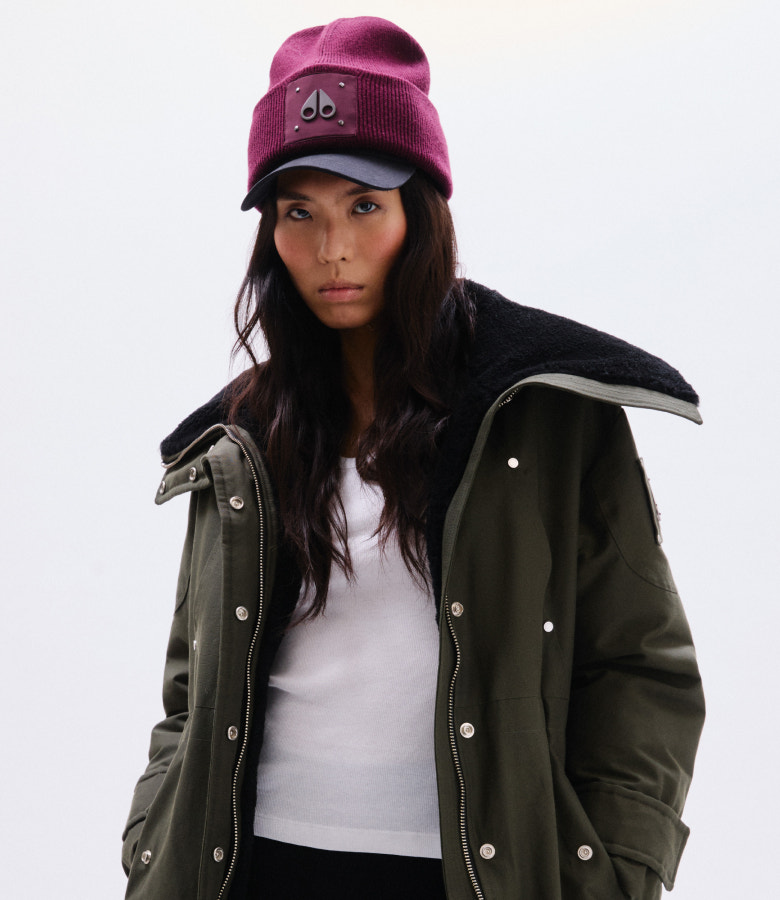2024-2025 MODERN SLAVERY STATEMENT
This report details the human rights due diligence conducted by the “Moose Knuckles” apparel brand (owned and operated by Modes Moose Inc.) (“Moose Knuckles”) in compliance with Bill S-211, the Modern Slavery Act in Canada. Our commitment is to uphold human rights across our supply chain, specifically addressing forced labour and child labour.
Link to Human Rights Statement PDF Here
Table of Contents:
- Introduction
1.1. Company Overview for the Report
1.2. Group Structure - Policy Commitment
2.1. Human Rights Policy Overview
2.2. Alignment with Bill S-211 - Supply Chain Mapping
3.1. Identification of Suppliers
3.2. Geographical Distribution - Risk Assessment
4.1. Identification of High-Risk Areas
4.2. Evaluation of Suppliers - Due Diligence Process Including Forced Labour and Child Labour Due Diligence
5.1. Supplier Assessments
5.2. Engagement with Suppliers
5.3. Audits and Site Visits
5.4. Risk Assessment Specific to Forced Labour and Child Labour
5.5. Preventative Measures - Training and Capacity Building
6.1. Education Initiatives for Employees and Suppliers
6.2. Future Education Initiatives for Employees and Suppliers - Collaboration and Partnerships
7.1. Engagement with NGOs and Government Agencies
7.2. Industry Collaboration - Reporting and Transparency
8.1. Annual Reporting Practices
8.2. Disclosure of Efforts and Outcomes - Additional Information & Board of Directors Sign Off
- Appendices & Supporting Documents
Note:This Table of Contents outlines the structure of the Human Rights Due Diligence Report, providing a clear overview of the topics covered and the organization of the report's content.
1. Introduction
1.1. Company Overview with Regards to Modern Slavery and Human Rights Due Diligence
Modern Slavery Statement for the Financial Year Ended March 31, 2025
This statement is made pursuant to Bill S-211, An Act to enact the Fighting Against Forced Labour and Child Labour in Supply Chains Act and to amend the Customs Tariff. This statement outlines the approach and initiatives by Moose Knuckles to identify and address the risks forced labour and child labour in its business operations and supply chains during the financial year commencing April 1, 2024 and ending March 31, 2025.
1.2. Group Structure
Moose Knuckles was established in February 2010, with its head office located at 225 Chabanel St. West, Suite 300, Montreal, QC.
2. Policy Commitment
We have a Human Rights Policy aligned with Bill S-211, emphasizing:
- Zero tolerance for forced labour, child labour, and any form of modern slavery.
- Adherence to international labour standards and legal requirements.
- Commitment to transparency and accountability in our operations and supply chain.
2.1. Human Rights Policy Overview
To uphold our Human Rights Policy, we expect all our suppliers to be socially responsible and compliant. All suppliers for Moose Knuckles must be certified for Social Compliance and provide detailed audit reports for their factory.
Moose Knuckles will only work with suppliers that respect the culture in which they operate, the local law and the workers who manufacture Moose Knuckles products.
2.2. Alignment with Bill S-211 (Modern Slavery Act, Canada)
Our alignment with Bill S-211, the Modern Slavery Act in Canada, underscores Moose Knuckles' steadfast commitment to upholding human rights and combating modern slavery in all its forms. We have integrated the principles and requirements of Bill S-211 into our Human Rights Policy, ensuring zero tolerance for forced labour, child labour, and any form of exploitation within our supply chain and operations. By adhering to this legislation, we prioritize transparency, accountability, and continuous improvement in our due diligence processes. Our efforts are aimed at fostering a supply chain that is free from human rights abuses, supporting the broader goal of eradicating modern slavery globally. This alignment with Bill S-211 serves as a cornerstone of our ethical framework, guiding our actions and initiatives to promote respect for human rights throughout our business practices.
3. Supply Chain Mapping
We have mapped our supply chain to identify:
- Direct and indirect suppliers, including all contractors and raw material sources.
- Geographical locations and potential risks related to forced labour and child labour.
3.1. Identification of Suppliers
Moose Knuckles has completed a supply chain mapping exercise to identify the location and importance of all Tier 1 and Tier 2 suppliers. A significant majority of our final stage production is split between China and Vietnam with a small portion in Peru, with the balance spread across other supply chains listed below.
3.2. Geographical Distribution
We purchase from approximately 75 suppliers split between finished goods (Tier 1) and raw materials (Tier 2). We purchase finished goods from suppliers in Vietnam, China, Peru, Canada, and Portugal. We purchase raw materials from suppliers in South Korea, China, Vietnam, Japan, Taiwan, and Canada Packaging of our products occurs in each country of origin.
4. Risk Assessment
Our risk assessment focuses on:
- Identifying high-risk activities and areas prone to forced labour and child labour.
- Evaluating suppliers based on risk factors such as industry, geographic location, and labour practices.
4.1. Identification of High-Risk Areas
The identification process to locate high-risk areas in our supply chain involves a comprehensive assessment that considers various factors.
We begin by mapping our supply chain to understand the geographic locations of our suppliers and contractors. Next, we evaluate the nature of activities and industries within each tier of the supply chain to identify sectors with higher vulnerability to human rights violations, including forced labour and child labour.
We also assess risk based on factors such as local laws and regulations, socioeconomic conditions, and historical data on human rights abuses in specific regions or industries.
This process enables us to prioritize resources and interventions effectively, focusing on areas where the risk of human rights violations is most prevalent. Regular reviews and updates of this identification process ensure that we remain proactive in addressing emerging risks and evolving challenges within our supply chain.
As part of our human rights’ due diligence process (“HRDD Process”), we use the ‘HRDD Workbook’ developed through the UNGC Business Human Rights Accelerator to map and identify high risk areas in our supply chain.
4.2. Evaluation of Suppliers
When evaluating new suppliers, Modes Moose implements a HRDD Process to ensure ethical sourcing practices.
This process begins with assessing the supplier's commitment to human rights through a self-assessing questionnaire covering key areas such as labour practices, working conditions, and compliance with international standards.
We review suppliers’ audits verifying their legal compliance and assess their industry reputation. Additionally, we conduct site visits to assess working conditions firsthand and identify any potential risks of human rights abuses, including forced labour and child labour.
Our HRDD Process also involves engaging with stakeholders, including local communities and workers, to gather insights into the supplier's operations and detect any red flags.
By integrating human rights considerations into our supplier evaluation process, we aim to establish partnerships with suppliers who share our commitment to upholding human rights and ethical standards throughout the supply chain.
The Social Compliance Assessment is part of our self-assessment process via our sustainability dashboard (using the www.sustain.life platform).
See example questionnaire in ADDENDUM 1.
5. Due Diligence Process Including Forced Labour and Child Labour Due Diligence
Our HRDD Process includes:
- Regular supplier assessments to monitor compliance with our Human Rights Policy and Quality Control requirements.
- Engaging with suppliers to address and mitigate risks related to forced labour and child labour through open dialogue; and
- Conducting audits and site visits to verify compliance and detect any signs of forced labour or child labour.
5.1. Supplier Assessments
The Social Compliance Assessment is a self-assessment completed by the suppliers on an annual basis as part of our Sustainability Assessment process (which also includes environmental disclosure). It is sent via our sustainability dashboard (using the www.sustain.life platform) and we ask that suppliers complete or update annually.
5.1. Engagement with Suppliers
Moose Knuckles has developed a workplace code of conduct ("Code") that all suppliers must acknowledge and agree to adhere to. The Code sets out the basic minimum requirements that all suppliers must meet to do business with us.
In addition to the specific provisions of the Code, Moose Knuckles communicates to its suppliers the expectation that they act reasonably in all respects and to ensure that no abusive, exploitative, or illegal conditions exist in their workplaces. Two notable issues covered by the Code are:
Country Law: Moose Knuckles’ suppliers must operate in full compliance with the laws of their respective countries and with all other applicable laws, rules, and regulations, including those relating to labour, worker health and safety and the environment.
Subcontracting: Moose Knuckles does not accept any subcontracted production of its products to unapproved factories under any circumstances. Moose Knuckles will only work with factories who comply with this Code and who have signed a copy of this Code and returned the signed copy to it. The supplier must agree to disclose to Moose Knuckles the name and address of every factory used in the production of our garments and products and have it approved by us in advance.
5.3. Audits and Site Visits
Moose Knuckles recognizes third party compliance auditing firms such as Intertek, SGS and Bureau Veritas. Audits can be carried out by any one of the above-mentioned companies, however, audits are not limited only to these, and suppliers may speak to Moose Knuckles QA departments’ compliance manager with any inquiries. Moose Knuckles requires full disclosure of all factories that produce, all or in part, Moose Knuckles branded products. No supplier may ever place any manufacturing of any Modes Moose products in a factory that has not been preapproved by our production team for any reason.
Like most audit companies, Moose Knuckles Canada, follows four grades to assess a supplier’s compliance:
- Low Risk (Compliant)
- Moderate Risk (Minor Violations)
- High Risk (Major Violations)
- Extreme Risk (Zero Tolerance)
Inspectors hold a meeting with factory management after each audit to review the audit findings, the grade assessed and any corrective actions that are required by the factory to meet the compliance code. Each grade carries specific timeframes for corrections to be made and re-audit dates.
5.4. Risk Assessment Specific to Forced Labour and Child Labour
To specifically address forced labour and child labour, we conduct risk-based assessments to identify indicators of forced labour or child labour in our supply chain, implement specific measures to prevent, detect, and respond to cases of forced labour and child labour, and we collaborate with specialized organizations and experts to enhance our understanding and approach to combatting these issues. This is clearly outlined in our Vendor Manual on Social Compliance.
5.5. Preventative Measures
At this time preventative measures are limited to industry knowledge gained by the production and sourcing teams while assessing potential vendors in high-risk locations. Vendors undergo assessments as outlined above and are visited by a team member prior to being engaged as a partner.
6. Training and Capacity Building
We provide training and capacity-building initiatives to educate employees, suppliers, and stakeholders on the risks and indicators of forced labour and child labour. These initiatives aim to empower individuals to recognize and report suspected cases of forced labour and child labour.
6.1. Education Initiatives for Employees and Suppliers
Moose Knuckles current approach to education with regards to human rights due diligence, forced labour and child labour includes the following initiatives:
- New production team hires are introduced to the vendor onboarding requirements and code of conduct documents, focusing on high-risk regions and supply chains
- The team participates in optional webinars and online training sessions
- When onboarding new suppliers in high-risk areas we seek out guidance from peers with local expertise
6.2. Future Education Initiatives for Employees and Suppliers
For 2025, we intend to implement a more robust and formal education program for all employees working closely with product development and production teams, as well as major suppliers, to address issues of forced and child labour in the apparel supply chain. This will enhance our mitigation and remediation strategies.
7. Collaboration and Partnerships
We collaborate with:
- NGOs, industry associations, and government agencies focused on combating forced labour and child labour.
- Peers and stakeholders to share best practices and support collective efforts to address these human rights abuses.
7.1. Engagement with NGOs and Government Agencies
A team from Moose Knuckles are currently participants in the United Nations Global Compact Business & Human Rights Accelerator for 2024 to inspire momentum and guide our team to move from commitment to action in our HRDD Process. The UNGC BHR Accelerator is a 6-month program that models the HRDD Process through a handon approach with industry professionals and peer learning groups.
Moose Knuckles are members of Textile Exchange and participants in various social compliance working groups for the purpose of peer-shared resources and guidance.
7.2. Industry Collaboration
- A team from Moose Knuckles are participating in the UNGC Business & Human Rights Accelerator Peer Group
- Our network of industry peers and pre-competitive working groups allow us access to activity, learning and guidance within our industry
8. Reporting and Transparency
Supply chain transparency reporting is of importance for Modes Moose as it enables us to foster accountability, build trust with stakeholders, and drive positive change within our industry. By openly disclosing information about our supply chain practices, including supplier relationships, sourcing locations, and efforts to address human rights issues, we demonstrate our commitment to ethical business conduct. Transparency reporting not only enhances our credibility but also empowers consumers, investors, and civil society to make informed decisions and hold us accountable for our actions. It promotes dialogue and collaboration with stakeholders, fostering collective efforts to address systemic challenges such as forced labour and child labour. Ultimately, supply chain transparency reporting serves as a catalyst for continuous improvement, guiding our journey towards a responsible and sustainable supply chain.
8.1. Annual Reporting Practices
We are committed to transparency reporting by:
- Publishing an annual Human Rights Due Diligence Report embedded within our Impact Report that includes specific information on efforts to address forced labour and child labour, starting in Fiscal Year 2025
- Disclosing progress, challenges, and outcomes related to combating forced labour and child labour in our supply chain via HRDD reporting on our website.
8.2. Disclosure of Efforts and Outcomes
Moving forward, we commit to conducting a comprehensive review of our due diligence protocols by examining the tools and resources that we currently have available including our supplier package to assess their efficacy and thoroughness. This process will begin in 2025 to be ready for our 2026 fiscal year report.
9 Additional Information
For additional information on our policies and practices toward eradicating modern slavery, human trafficking and forced labour in our supply chain, please contact sustainability@mooseknuckles.com. We welcome your feedback on our disclosure and our efforts to prevent modern slavery.
Board of Directors Sign-Off
The above report has been presented to Modes Moose’s governing body for review and has been approved as written.
This statement is made pursuant to Bill S-211, An Act to enact the Fighting Against Forced Labour and Child Labour in Supply Chains Act for the financial year ending 31/03/2025. It has been issued on behalf of Moose Knuckles and approved by its board of directors.
Signed,
Victor Luis, Executive Chairman
May 29, 2025
ADDENDUM 1 – SAMPLE HRDD QUESTIONNAIRE:
Sustainability Dashboard (www.sustain.life) Supplier Assessment – questions on labour and human rights
Fair Labour
- Do you have an occupational health and safety program?
- Do you provide appropriate personal protective equipment (PPE) to all at-risk workers?
- Are your workers allowed at least one day off every seven days?
- Under normal circumstances, do workweeks exceed 60 hours, inclusive of overtime?
- Is overtime pay above the regular pay rate?
- Do employees have the right to freedom of association and collective bargaining (unionizing)?
- Do you have a policy to prevent workplace discrimination and harassment?
- Is your workforce comprised of more than 10% of contingent, temporary, or seasonal workers?
- Do you provide worker housing or dormitories?
- Do you provide health benefits to workers where governments do not?
Human Rights
- Do you have a human rights policy?
- Have you employed child workers in the past 10 years? (“Child” refers to a person under the age of 15, or under the age to complete a compulsory education, or under the minimum age for employment in the country—whichever is greatest. This excludes internships.)
- Are workers free to terminate their employment at any time?
- Do you withhold worker identification, work permits, or travel documents for any reason?
- Do you treat workers humanely—meaning no threats or actual physical or mental abuse?
- Do workers have access to clean toilets, potable water, and sanitary food preparation and eating areas?
- Are your facilities equipped with adequate emergency exits that stay unlocked during the workday?
Responsible Purchasing
- Do you have a supplier code of conduct?
- Do you evaluate your suppliers on social and environmental criteria?
- Do you source raw material or ingredients from conflict regions?
- Do you consider sustainability performance when selecting suppliers?
- Do you consistently exclude suppliers from consideration for known environmental, human rights, labour, or ethics violations?







